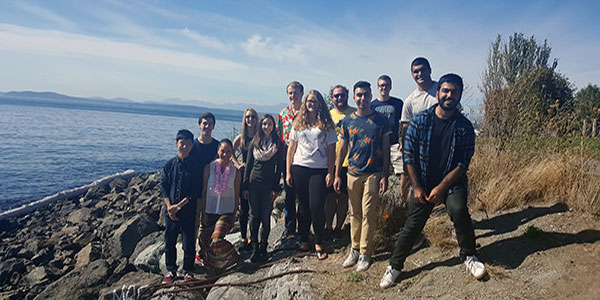Photo: BioE’s Yalow family, led by Senior Lecturer Alyssa Taylor
Bioengineering has become a popular undergraduate major at UW. When it was first offered in 2001, it admitted 20 students in its first year. 15 years later, the program has experienced exponential growth. Now, each incoming class welcomes 75 students, and even further growth is projected.
UW BioE’s undergraduate program organizes students into a ‘cohort’ structure. Each incoming class moves through the program and graduates together. They take BioE core required classes, offered once per year, at the same time. At a huge university like UW, the cohorts create a close-knit community – they help students meet their peers, make friends and build a support network.
As the cohort size has grown, the department is pursuing a unique strategy to maintain what has become a central, well-received feature of the program. “Each year, the students cite the cohort model as one of their favorite aspects of the program,” explains Senior Lecturer Alyssa Taylor, who also acts as the faculty coordinator of the undergraduate program. “We’re aiming to keep the small community feel and robustness of the cohort.”
BioE ‘families’ seek to organize each cohort into smaller groups. This model was initially inspired by the efforts of UW BMES, BioE’s student organization, to pair junior students with senior mentors. In spring 2016, BMES representatives brought the idea to department faculty and advising staff, and the department launched the families in the fall.
Currently, there are five families, each led by a faculty mentor and named after a famous person in science or engineering history. 2016’s families include: Rushmer (led by Senior Lecturer Chris Neils), Hoffman (led by Associate Professor Herbert Sauro), Huntsman (led by Full-time Lecturer Karen Thickman), Estrin (led by Full-time Lecturer Dianne Hendricks and Yalow (led by Dr. Taylor).
A major goal of the families is to facilitate student mentorship. Each family divides into smaller groups that, like what was once done by BMES, pairs more junior students with senior mentors. Once admitted into BioE each student is automatically assigned to a family, and a mentor. The families form an official mentorship structure within the program, which Dr. Taylor attributes as a unique feature among UW engineering departments. Some families also engage graduate student leads to offer additional mentoring on navigating the process of selecting and getting into a research lab.
Families are designed to be student-run and offer opportunities for leadership and team-building. Each family elects student officer leads to work with the faculty lead to coordinate events and activities. Other student leadership positions within each family vary – the Yalow family, for example, also has a mentorship chair, a social chair and a web master. Family activities range from academic – such as study nights – to fun – like bowling and potlucks.
Each family benefits from the expertise and interests of their faculty and student leaders and members. The Estrin family’s faculty lead, Dr. Hendricks, is also the faculty lead for Bioengineering Outreach
BioE has invested in the families, and has provided $200 for each family to spend for events and activities. Beyond building community and offering opportunities for mentorship and leadership, the families support BioE’s commitment to fostering an inclusive and supportive network of peers, grad students and faculty. “We recognize that Bioengineering is an academically challenging discipline, and that peer mentoring and support is critical for student success. By creating a space for students to come together, build new partnerships, develop cross-cohort relationships, and integrate new ideas and perspectives into their education, we aren’t just helping the student grow, we’re helping the whole field of Bioengineering grow,” says Clay Schwenn, Director of Academic Services.



